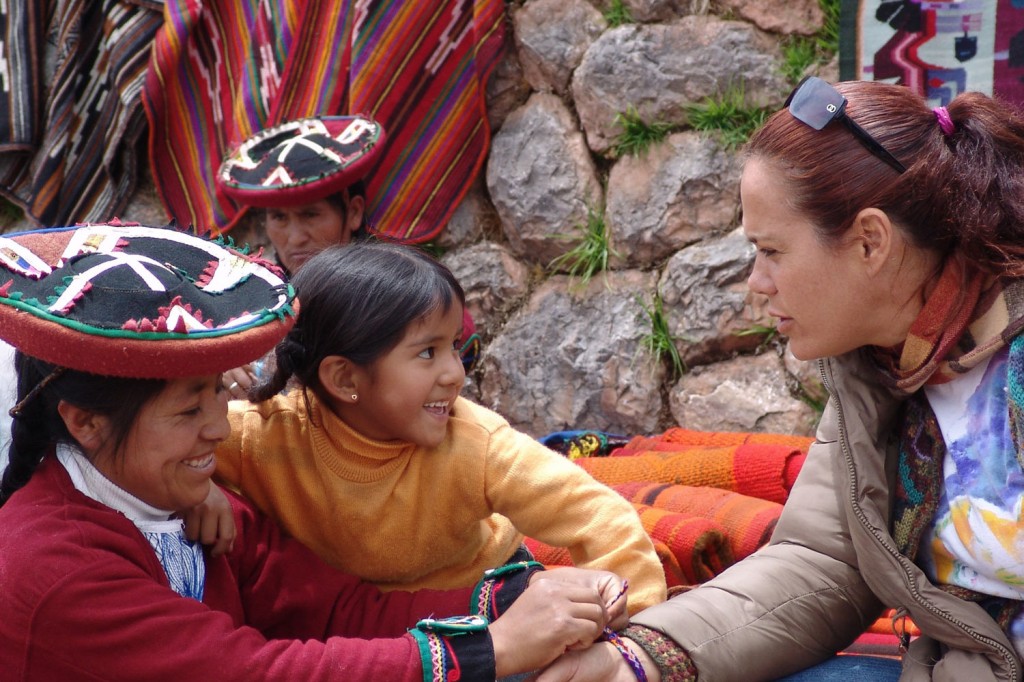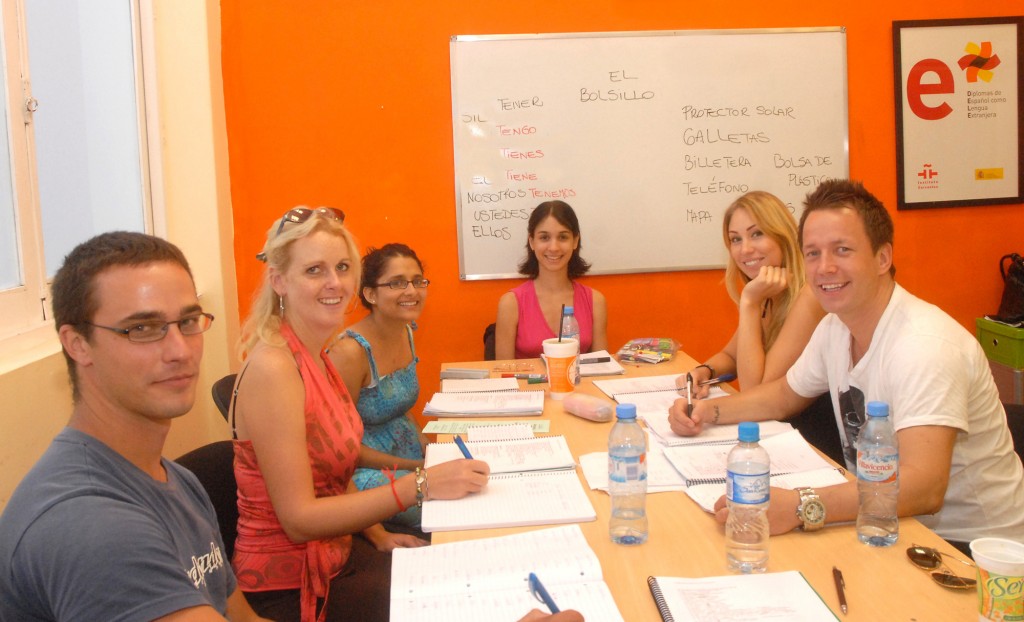
1. PAY ATTENTION IN CLASS AND FOLLOW INSTRUCTIONS: Remember that in learning, 20% of success depends on the teacher, while the other 80% depends on the effort and dedication invested by the student. Try not to get distracted in class (you can always talk about last night’s party during the break). Try to go to the bathroom during breaks and not during class times. Out of respect for your teacher and your classmates, please turn off your cell phone before entering the classroom.
Please take the time to complete any tasks or exercises assigned by teachers to be carried out at home as they are essential in strengthening and/or testing what you have learned. The teachers are trained in a number of teaching methods and use them to add variety to the classes and to accustom students to different things. The games played in class are not really games, but classroom dynamics with a specific learning objective. Everything is done for educational purposes. Please trust your teachers as they have many years of experience in teaching Spanish to foreigners.
1. PRESTA ATENCIÓN EN CLASE Y SIGUE LAS INSTRUCCIONES Recuerda que el 20% del éxito del aprendizaje depende del profesor y el 80% del esfuerzo y dedicación del estudiante. No te distraigas en clases (para comentar la fiesta de anoche tienes el recreo), trata de ir al baño en el recreo y no en horas de clases. Apaga tu teléfono móvil antes de entrar a clases por respeto a tu profesor y a tus compañeros.
Las tareas o deberes que el profesor te asignará para que hagas en la casa tiene un propósito esencial que es fortalecer y / o poner a prueba los conocimientos aprendidos, por ende, debes hacerte el tiempo para cumplir con ellas. Los profesores saben muchos métodos de enseñanza y los usan todos para dar variedad a las clases y para que sus alumnos se acostumbren a cosas diferentes. Los juegos que se practiquen en clase en realidad no son juegos realmente, sino dinámicas con un objetivo específico de aprendizaje, los profesores hacen todo con un propósito educativo. Confía en tus profesores, ellos llevan años enseñando español a extranjeros.

Be sure to take opportunities to practice Spanish outside of class.
2. PRACTICE OFTEN, BOTH INSIDE AND OUTSIDE THE CLASSROOM: If you take a plane and travel thousands of kilometers to a Spanish-speaking country to attend a Spanish-speaking school in a Spanish-speaking city, does it make sense to continue to speak to people in your own language, whether English, German, Portuguese, etc.? Of course it doesn’t! It would almost be a waste of money. To make the most of your time in South America, try to communicate in Spanish. It’s no big deal if you make mistakes, in fact, it’s normal because you are still learning.
Is it difficult in the beginning? Yes it is, but it was also difficult when you were learning to walk, yet you can now walk and run very well, can’t you? If at the start you find it exhausting to speak in Spanish all day, set yourself a goal. For example: “I’m going to speak Spanish for a minimum of 4 hours a day throughout this week.” The next week you can aim for 6 hours, followed by 8 hours the week after that. Set yourself challenges to overcome.
2. APROVECHA DE PRACTICAR DENTRO Y FUERA DEL AULA Si tomas un avión y viajas miles de kilómetros hasta un país hispanoparlantes y vas a una escuela donde todos hablan español, en una ciudad donde todos hablan español ¿es razonable que hables con la gente en tu lengua, inglés, alemán, portugués, etc.? Verdad que no. Es casi como perder un poco de tu dinero. Por eso aprovecha al máximo tu tiempo en Sudamérica, trata de comunicarte en español, si comentes errores, no importa, es normal, porque estás aprendiendo.
¿Es muy difícil al principio? Sí, es difícil al principio, cuando aprendiste a caminar también fue difícil y ahora caminas y corres muy bien ¿o no? Si al principio es muy cansador para ti hablar todo el día en español, ponte una meta (hablar en español 4 horas diarias como mínimo esta semana), la próxima semana (6 horas por día) la siguiente semana (8 horas diarias), etc. etc. Supera tus propias metas.
3. SEE THE GLASS AS HALF FULL, NOT HALF EMPTY: Learning is not an instant process. There are no magic formulas or shortcuts. It is a gradual process but the results do improve day by day. If you can’t understand or answer a single question on your first day, then you have a lot of studying to do at home. However, if by the second day you begin to understand some of the questions even though you can’t answer them, you have still made progress.
If by the third day you understand even more questions and can now also answer some of them, even though you still make some mistakes, you have made progress again. If on the fourth day you reach the point where you understand the majority of the questions and can even answer a few of them making no mistakes at all, then you have made even more progress. Don’t get stressed out if you don’t know the meaning of a word. You should feel proud and happy that you understood the overall idea. Focus only on what you have gained, not what you have lost.
3. MIRA EL VASO MEDIO LLENO Y NO MEDIO VACÍO Aprender no es un proceso instantáneo, no hay fórmulas mágicas ni hay caminos cortos. Es un proceso gradual, pero con resultados que mejoran día a día. Si el 1° día no entiendes ninguna pregunta y no puedes responder, tienes que estudiar mucho en casa. Si el 2° día ya entiendes algunas preguntas, pero no puedes responder, aún así tuviste un avance.
Si el 3° día entiendes más preguntas y puedes responder algunas, aunque cometas errores, nuevamente avanzaste, si el 4° día entiendes la mayoría de las preguntas y las respondes algunas con errores y unas pocas sin error, también hubo avances. No deberías estresarte porque no comprendiste una palabra, deberías sentirte orgulloso y contento porque comprendiste la idea general. No te concentres en lo perdido, sino en lo ganado.
4. MAKE THE MOST OF GETTING TO KNOW PEOPLE, PLACES AND CULTURES: Travelling in South America is an opportunity that anyone in the world would love to have, so make the very most of it. Share experiences with your friends and teachers both inside and outside of the classroom. Participate in those activities that enable you to make friends, enjoy yourself, relax etc. Just walking through a city different to your own is entertaining in itself. It is even more exciting when every day you try food that you wouldn’t normally eat in your own country. Culture is not only present in museums or at the opera. You’ll find it in the streets, in the parks, in the architecture of the city, in the country’s music, its restaurants and by conversing with the locals. You’ll never find a better way to experience all of this than by studying and travelling in a Latin American country.
4. APROVECHA DE CONOCER PERSONAS, LUGARES Y LA CULTURA Viajar a Sudamérica es una oportunidad que cualquier persona en el mundo adoraría tener. Aprovéchala al máximo, comparte con tus compañeros y profesores dentro y fuera de la sala de clases. Participa en las actividades donde podrás hacer amistad, recrearte, relajarte, etc. Considera que tan sólo caminar por una ciudad diferente a la tuya, ya es algo entretenido, si a esto le agregamos que acá además podrás comer todos los días comidas diferentes a las de tu país, eso aumenta la emoción. La cultura no sólo está presente en los museos, ni el la ópera, tú puedes encontrarla en las calles, en los parques, en la arquitectura de la ciudad, en la música del país, en sus restaurantes, en la conversación con los nativos. Eso nunca lo tendrás de mejor forma que estudiando y viajando en un país latino.
5. COMPETE WITH YOURSELF, NOT YOUR CLASSMATES: You have travelled to South America to learn Spanish and you will obviously learn a lot, but you are also on vacation. We recommend that you aim to improve your Spanish day by day. Set yourself real and achievable short-term goals. Don’t let it bother you if you are not the best or the quickest in the class. Who cares? What really matters is that your Spanish is a little better today than it was yesterday and tomorrow it will be even better. Don’t concentrate on how quickly other students are moving in the class and you shouldn’t think about how much you still have to learn either. This is not a good tactic since you can end up feeling overwhelmed and discouraged. Focus on how solid you own progress is and work at perfecting it. Using Spanish inside and outside of the classroom is the best thing you can do to improve.
5. COMPITE CONTIGO MISMO Y NO CON TUS COMPAÑEROS Has viajado a Sudamérica para aprender español y es seguro que aprenderás y mucho. Pero también estás de vacaciones. Te recomendamos siempre mejorar tu español día a día, ponte metas reales y alcanzables a corto plazo. No sufras si no eres el mejor o el más rápido de la clase ¿a quién le importa eso? Lo que realmente importa es que tu español sea hoy un poco mejor que ayer y mañana un poco mejor que hoy. No te concentres en que tan rápido van los otros estudiantes de la clase, tampoco pienses en lo mucho que falta por aprender, esa no es buena táctica, ya que terminará por abrumarte y desalentarle. Enfócate en que tan sólido es tu propio avance y trabaja por perfeccionarlo. Usa tu español dentro y fuera de la clase, es lo mejor que puedes hacer para mejorarlo.
